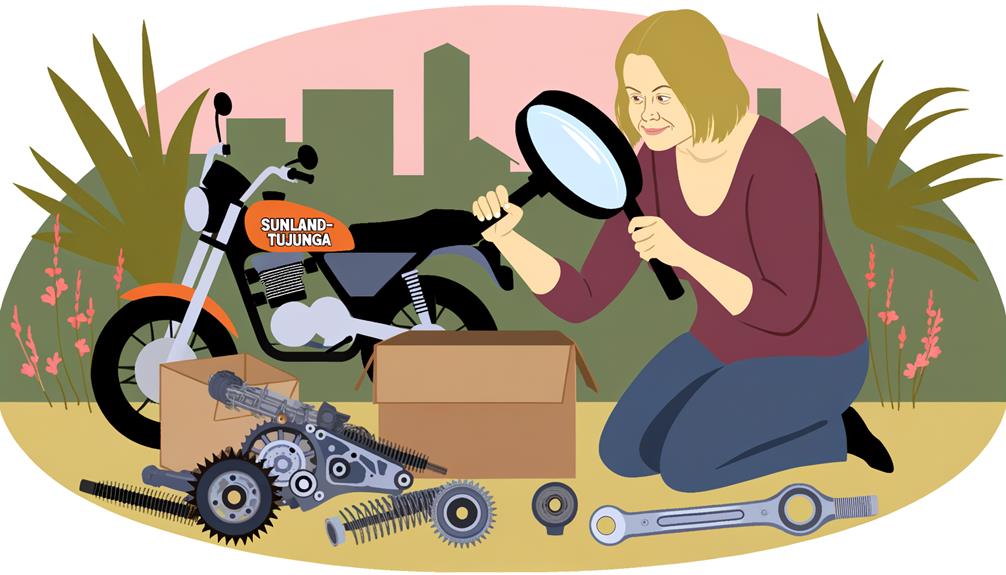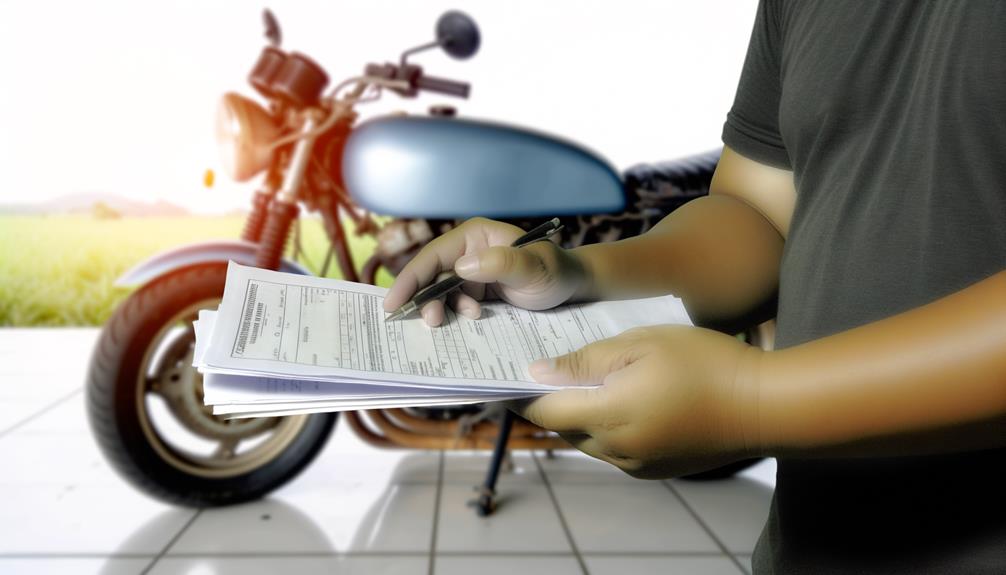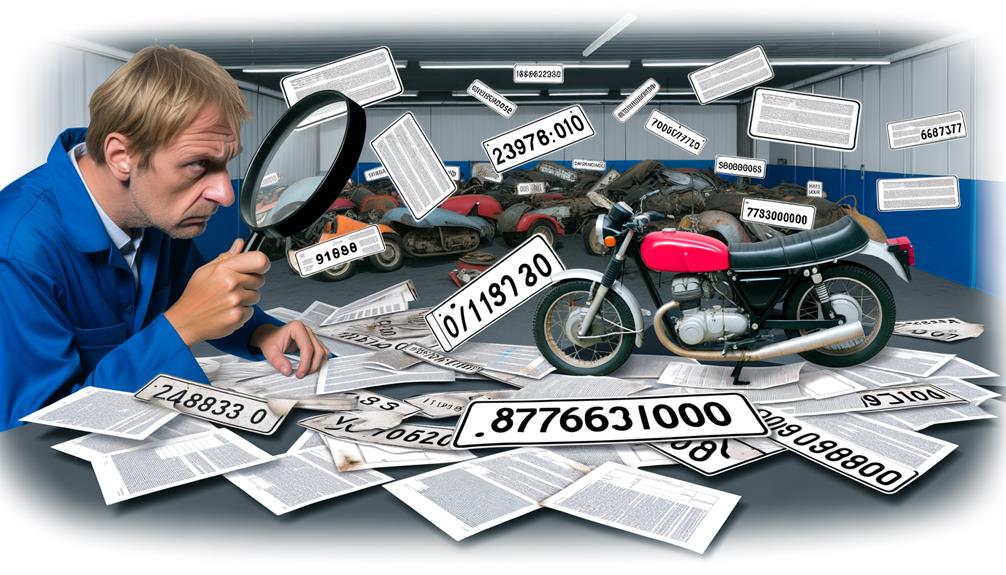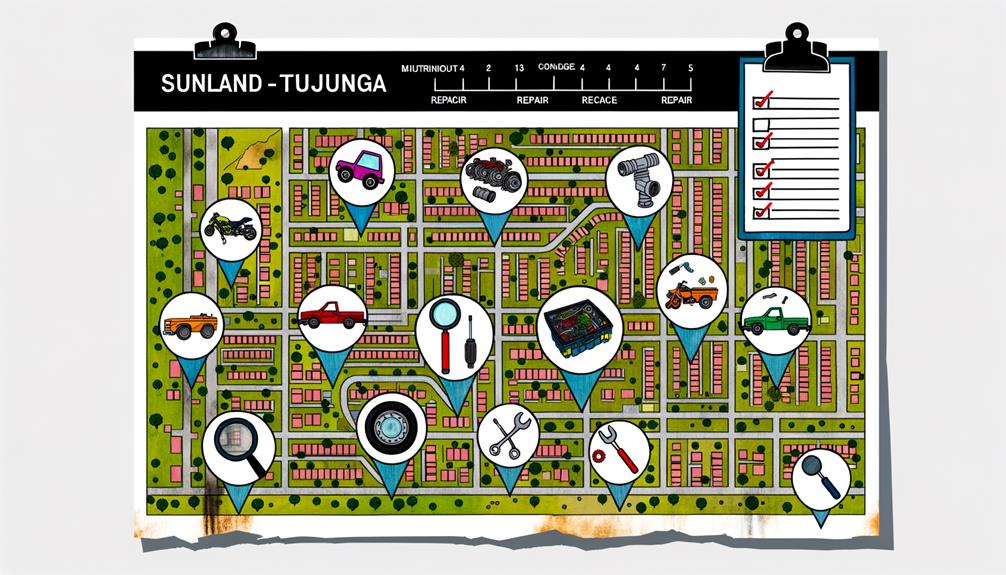To navigate the VIN verification process for your salvaged motorcycle in Sunland-Tujunga, start by gathering necessary documents such as the out-of-state title, previous registration, and a valid ID. Complete the REG31 form with specifics about your motorcycle, including year, make, and model, and make sure the vehicle complies with California emissions standards. During the inspection, make sure all labels, including federal safety and emissions labels, are intact and visible. Verify that the VIN on your motorcycle matches the documentation to avoid delays. Finally, a careful check of all paperwork before the inspection can smooth your path to registration and reveal additional helpful insights.
Understanding VIN Verification

Understanding VIN verification is vital when dealing with salvaged motorcycles. When you're aiming to guarantee that your motorcycle not only aligns with legal standards but also prioritizes your safety, this process becomes essential.
VIN verification is the systematic confirmation of your motorcycle's identity, conducted by DMV officials. They meticulously check if the Vehicle Identification Number (VIN) on your bike matches the one listed on its title. This step is critical in preventing fraud and confirming the motorcycle's legitimacy.
A key aspect of this process is the federal safety label. If your motorcycle lacks this label, it can't pass verification. This label is an indication of the bike's adherence to safety norms, which is especially significant for salvaged motorcycles that have been reconstructed after significant damage.
In cases where the motorcycle has undergone major changes, such as a modification in fuel type, a VIN verification becomes mandatory to guarantee compliance with safety and emissions standards.
Preparing for the Inspection
To start preparing for your motorcycle's VIN inspection, first gather all necessary documents like the out-of-state title and any previous registration papers. This initial step is important for a smooth VIN verification process.
To guarantee compliance, also verify that your motorcycle adheres to California emissions standards, as non-compliance can prevent successful registration.
Next, you'll want to complete the REG31 form, which is essential for documenting the bike's specifics including year, make, model, and VIN location.
Once your paperwork is in order, it's time to prepare the motorcycle itself. A clean bike not only looks good but confirms that all labels, such as the federal certification and emissions stickers, are visible and intact.
These labels are significant as they provide critical information during the inspection.
Additionally, double-check that the VIN on your motorcycle matches the one on your documentation. Any mismatch can cause significant delays or even lead to a rejection of your VIN verification.
To avoid these issues, it's crucial to guarantee everything matches perfectly.
Necessary Documentation

Gathering the right documents is your first step toward successfully verifying your salvaged motorcycle's VIN in Sunland-Tujunga. You'll need to kick off with either an out-of-state title or a Manufacturer's Statement of Origin (MSO), both serving as your proof of ownership. It's vital to guarantee these pieces are handy as they form the backbone of your documentation process.
Additionally, a completed REG31 form is essential. This form will detail your motorcycle's year, make, model, and the specific location of the VIN, all of which are critical for the verification process. Make sure the information provided is accurate to avoid any hiccups during verification.
Remember, your motorcycle must also have a federal safety label and an emissions label. These are non-negotiable; lacking either will deem your motorcycle ineligible for VIN verification. Safety and compliance can't be overlooked here in California, especially considering the stringent standards set to maintain road safety and environmental health.
When you're ready to present your motorcycle for verification, bring along a valid ID and any previous registration documents. These will confirm your ownership and identity.
If you're riding a gas motorcycle, a Smog inspection certificate might also be required, so keep that in mind.
Inspection Criteria
Once you've gathered all necessary documents, your next step is the inspection itself, where specific criteria must be met.
During this significant phase of the VIN verification process, the inspector will meticulously check your motorcycle's VIN against the details listed on your REG31 form. This includes verifying the year, make, and model of your motorcycle to guarantee everything matches up precisely.
Additionally, the inspector will document the VIN's location on your bike and will note key features such as the number of wheels and the type of fuel used.
It's essential that your motorcycle also has a federal certification label and an emissions label visibly attached. These labels are critical as they confirm your motorcycle complies with both safety and environmental standards.
Common Verification Issues

Often, when dealing with salvaged motorcycles, you'll encounter several common issues during the VIN verification process. One of the primary challenges is discrepancies between the motorcycle's VIN and its title. These mismatches can lead to significant delays or outright refusals in the verification process, making it tough for you to register your bike in Sunland-Tujunga.
You might also run into problems with missing or damaged federal safety labels. Without these labels, your motorcycle could be deemed ineligible for VIN verification, blocking the registration path altogether.
Moreover, odometer discrepancies are a frequent headache. Whether it's due to rollbacks or just inaccurate mileage reporting, these issues often raise red flags with DMV officials, who are vigilant about guaranteeing the accuracy of your bike's history. This scrutiny is vital for your safety and that of others on the road.
Lastly, improper documentation or the absence of necessary supporting documents can further complicate the VIN verification. Confirming you have all required paperwork in order is essential to navigate this process smoothly.
Always double-check your documentation before heading to the verification, as this will help you avoid unnecessary hurdles and guarantee a safer ride.
Salvage-Specific Considerations
After addressing common issues in VIN verification, it's important to contemplate specific guidelines for salvaged motorcycles. If you're dealing with a salvaged bike, remember that California Highway Patrol (CHP) inspections are mandatory, unlike the standard VIN verification. This is vital because your motorcycle's been classified as a revived salvage vehicle, bringing additional scrutiny to guarantee safety and compliance.
You can't proceed with the VIN verification if your motorcycle was previously deemed junked or if it's a model from 1980 or newer lacking a federal safety label. You'll need to gather specific documentation to move forward. This includes a salvage title, proof of your ownership, and any records detailing repairs made.
These documents are essential not only for verification purposes but also to confirm that the VIN matches exactly with the title and DMV records. Any discrepancy could greatly complicate the process.
For a smoother experience, consider contacting a licensed registration service specializing in salvage vehicles. They're well-versed in the nuances of such cases and can notably streamline the VIN verification process in Sunland-Tujunga.
Making sure that all your paperwork is in order and seeking professional assistance will make traversing these salvage-specific considerations far less intimidating.
Post-Verification Steps

Having successfully completed the VIN verification for your salvaged motorcycle, you'll need to secure the REG31 form, which serves as official proof of the inspection. This document is critical not only for your records but also for the next steps in getting your bike fully legal and road-ready.
Next, you'll head over to the DMV or their online platform to update the vehicle registration. Here, you'll provide the DMV database with the verified VIN along with any supporting paperwork that demonstrates your motorcycle's compliance with safety regulations.
It's important to guarantee all documents are accurate and complete to avoid any hiccups in the registration process. You'll also be required to pay any applicable fees that come with registering a salvaged motorcycle. These fees contribute to the processing and issuance of your new title and registration, marking the official recognition of your motorcycle's roadworthiness.
Lastly, keep a copy of all your verification and registration paperwork. These documents aren't only essential for insurance purposes but might also be needed if you decide to sell the motorcycle later.
Additionally, stay informed about any changes in local regulations to guarantee you remain compliant with state laws.
Legal Implications
Maneuvering the legal landscape is vital when dealing with salvaged motorcycles. As you engage in the VIN verification process, you must be aware of the legal implications that accompany a salvage title. It's essential to guarantee that all documentation requirements are meticulously met to avoid any legal hurdles.
Remember, if your motorcycle was previously declared junked or lacks valid documentation, it won't qualify for VIN verification, which is a mandatory step in California.
The state mandates a thorough inspection by the California Highway Patrol (CHP) to confirm the motorcycle's compliance with safety and emissions standards. Skipping this step or failing to provide the necessary proof of repairs and the proper salvage title can lead to significant legal challenges. These might include fines or complications when you attempt to transfer ownership.
You'll want to stay on top of these requirements and guarantee every document is in order before proceeding. Adhering strictly to these rules not only helps you navigate the verification process smoothly but also protects you from potential legal issues that could arise from non-compliance.
Safety and legality go hand-in-hand, ensuring your journey back on the road is secure and sanctioned.
Additional Resources

Maneuvering the complex process of VIN verification for salvaged motorcycles, you'll find invaluable support from local registration services. Ensuring your bike meets legal and safety standards is paramount, and services like Quick Auto Tags in Sunland-Tujunga can guide you through each step.
As you prepare, remember the importance of having all your supporting documents ready. Your original title, bill of sale, and any repair receipts are essential to streamline this process.
The California Highway Patrol (CHP) plays a vital role in this scenario. Since salvaged motorcycles need a CHP inspection before the VIN verification can proceed, it's wise to schedule this as early as possible. This inspection confirms your motorcycle's eligibility for verification by checking for the presence of federal safety labels, mandatory for bikes manufactured post-1980.
If you find the documentation requirement overwhelming or if you're unsure about the status of your motorcycle, don't hesitate to seek help. Local experts are there to assist, ensuring you don't miss any vital steps.
They'll help verify that your motorcycle isn't just revived but is also fully compliant with all necessary regulations, setting you on the path to a safe and legal riding experience.
Frequently Asked Questions
How Much Is a VIN Verification in California?
In California, you'll typically pay between $50 and $100 for VIN verification. Prices vary by provider and location, so it's wise to check for any additional fees before scheduling your service.
Who Is Authorized to Do a VIN Verification in California?
In California, you can get your VIN verified by DMV staff, certified VIN verifiers, or trained law enforcement officers, including CHP for salvaged bikes. Confirm they're authorized for your safety and compliance.
How Do I Register a Salvage Title for My Motorcycle in California?
To register your salvage title in California, submit the title, completed registration form, and fees to the DMV. They'll inspect your bike and verify the VIN before issuing a rebuilt title for road use.
Can CHP Do a VIN Verification?
Yes, the CHP can conduct a VIN verification for your vehicle, including salvaged motorcycles. You'll need to schedule an appointment and bring necessary documents like proof of ownership and any repair records.







